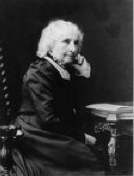Anne Whitney

Anne Whitney (September 2, 1821 in Watertown, Massachusetts – January 23, 1915 in Boston, Massachusetts) was an American sculptor and poet.
Early years
As with many other early, successful 19th century women sculptors Whitney came from a supportive and liberal – in her case Unitarian – family background. She was homeschooled as a youngster, and later traveled to Europe where she studied in Rome, Munich, and Paris before she returned to the US. In 1846 she opened a small school in Salem, Massachusetts.
In the 1860s she exhibited work in the Boston gallery of De Vries, Ibarra & Co.[1] A well-known supporter of both the abolitionist and suffragette movements, Whitney herself was to publicly feel the brunt of the sexism of the day when, in 1875, the commission for a statue of Charles Sumner that won a competition was denied her when it was discovered that the winning model was created by a woman.[2]
Career
Whitney and her companion, Addy Manning, lived abroad in the 1860s and 1870s, in Rome, Florence, and Paris. Associated with a group of female artists described as the "white, marmorean flock" by Henry James, Whitney's life abroad is well documented by more than 400 letters she sent to her family,[3] now among more than 4,000 letters, photographs, and other documentation in the Anne Whitney Archive at Wellesley College.[4] Among her well-known public monuments is the statue of Samuel Adams (1876) located in the National Statuary Hall Collection in the US Capitol, Washington D.C.; another is the statue of Leif Ericson (1887) in Boston, another edition of which was that same year placed in Juneau Park, Milwaukee, Wisconsin.
She was an accomplished portraitist, completing statues and busts of such famous individuals as John Keats, Samuel Adams, Toussaint l'Ouverture, William Lloyd Garrison, Charles Sumner, the suffragist Frances Willard, Harriet Beecher Stowe, Samuel Sewall, Alice Freeman Palmer, Robert Gould Shaw, Eben Norton Horsford, Harriet Martineau, Jennie McGraw Fiske, Lucy Stone and others.
Other of her works can be found in the collections of the Smithsonian Institution, Amherst College, Cornell University, Dallas Museum of Art, Harvard University, Smith College, Wellesley College, the Women's Christian Temperance Union, Newark Museum, Harriet Beecher Stowe Center,[5] Mark Twain Memorial, and the Boston Public Library.
The article "Mapping the 'White Marmorean Flock': Anne Whitney Abroad, 1866–1867," uses Whitney's extensive correspondence to create a timeline and associated maps of two trips Whitney made in Europe during this period.[6]
Works
123 works by Anne Whitney are listed in the Art Inventories Catalog hosted by the Smithsonian American Art Museum.[7] These include:
- Abby Adeline Manning Peabody Essex Museum, Salem, Massachusetts[8]
- Laura Brown, 1859 Smithsonian American Art Museum, Washington, DC[9]
- Lady Godiva, ca. 1861–1864 Dallas Museum of Art, Dallas, Texas[10]
- Samuel Adams, 1876 United States Capitol, Washington, DC[11]
- William Lloyd Garrison, 1879 Massachusetts Historical Society, Boston, Massachusetts[12]
- Harriet Beecher Stowe, 1892 Mark Twain Memorial[13]
Image gallery
-

Portrait of Whitney by A. Sonrel, ca.1874
-
Leif Eriksson statue, Commonwealth Avenue, Boston, Massachusetts. Sculpted in 1887.
-

Samuel Adams statue, Dock Square, Boston
Sources
| Wikimedia Commons has media related to Anne Whitney. |
| Wikisource has original works written by or about: Anne Whitney |
- Murdock, Myrtle Cheney, National Statuary Hall in the Nation's Capitol, Monumental Press, Inc., Washington D.C., 1955.
- Compilation of Works of Art and Other Objects in the United States Capitol, Prepared by the Architect of the Capitol under the Joint Committee on the Library, United States Government Printing House, Washington, 1965.
- Opitz, Glenn B, Editor, Mantle Fielding’s Dictionary of American Painters, Sculptors & Engravers, Apollo Book, Poughkeepsie NY, 1986.
- Rubenstein, Charlotte Streifer, American Women Sculptors, G.K. Hall & Co., Boston, 1990.
- Eleanor Tufts. "An American Victorian Dilemma, 1875: Should a Woman Be Allowed to Sculpt a Man?" Art Journal, Vol. 51, No. 1, Uneasy Pieces (Spring, 1992), pp. 51–56.
- Fowler, Cynthia. "Anne Whitney's Contribution to Nineteenth-Century American Sculpture." Masters Thesis, Harvard University, Extension School, Cambridge, MA 1994.
References
- ↑ Ladies' Repository: a Universalist Monthly Magazine (Boston: Universalist Publishing House, no.37 Cornhill), April 1867
- ↑ "Back Bay East". Boston Women's Heritage Trail.
- ↑ "Introduction, Anne Whitney Abroad, 1867–68". www.19thc-artworldwide.org. Retrieved 2015-07-26.
- ↑ "Primary Sources, Anne Whitney Abroad, 1867–1868". www.19thc-artworldwide.org. Retrieved 2015-07-26.
- ↑ "Welcome to the Harriet Beecher Stowe Center". Retrieved 1 January 2015.
- ↑ "Anne Whitney Abroad, 1867–68". www.19thc-artworldwide.org. Retrieved 2015-07-25.
- ↑ "SIRIS – Smithsonian Institution Research Information System". siris-artinventories.si.edu. Retrieved 2015-07-26.
- ↑ Whitney, Anne. Abby Adeline Manning (1836–1906).
- ↑ "Artworks Search Results / American Art". americanart.si.edu. Retrieved 2015-07-26.
- ↑ Whitney, Anne (1861-01-01). Lady Godiva.
- ↑ Whitney, Anne (1876-01-01). Samuel Adams.
- ↑ Whitney, Anne (1878-01-01). William Lloyd Garrison (1805–1879).
- ↑ Whitney, Anne (1892-01-01). Harriet Beecher Stowe.
External links
- Historic American Buildings Survey, Library of Congress. Flagstaff Park, Massachusetts Avenue & Kirkland Street, Cambridge, Middlesex County, MA
- Museum of Fine Arts, Boston. Le Modèle (bronze), 1875
|

